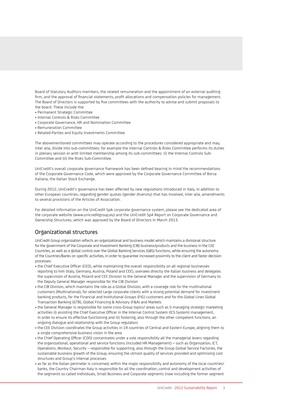
Board of Statutory Auditors members, the related remuneration and the appointment of an external auditing
firm, and the approval of financial statements, profit allocations and compensation policies for management.
The Board of Directors is supported by five committees with the authority to advise and submit proposals to
the board. These include the:
• Permanent Strategic Committee
• Internal Controls & Risks Committee
• Corporate Governance, HR and Nomination Committee
• Remuneration Committee
• Related-Parties and Equity Investments Committee
The abovementioned committees may operate according to the procedures considered appropriate and may,
inter alia, divide into sub-committees: for example the Internal Controls & Risks Committee performs its duties
in plenary session or with limited membership among its sub-committees: (i) the Internal Controls Sub-
Committee and (ii) the Risks Sub-Committee.
UniCredit’s overall corporate governance framework has been defined bearing in mind the recommendations
of the Corporate Governance Code, which were approved by the Corporate Governance Committee of Borsa
Italiana, the Italian Stock Exchange.
During 2012, UniCredit’s governance has been affected by new regulations introduced in Italy, in addition to
other European countries, regarding gender quotas (gender diversity) that has involved, inter alia, amendments
to several provisions of the Articles of Association.
For detailed information on the UniCredit SpA corporate governance system, please see the dedicated area of
the corporate website (www.unicreditgroup.eu) and the UniCredit SpA Report on Corporate Governance and
Ownership Structures, which was approved by the Board of Directors in March 2013.
Organizational structures
UniCredit Group organization reflects an organizational and business model which maintains a divisional structure
for the government of the Corporate and Investment Banking (CIB) business/products and the business in the CEE
Countries, as well as a global control over the Global Banking Services (GBS) functions, while ensuring the autonomy
of the Countries/Banks on specific activities, in order to guarantee increased proximity to the client and faster decision
processes:
• the Chief Executive Officer (CEO), while maintaining the overall responsibility on all regional businesses
reporting to him (Italy, Germany, Austria, Poland and CEE), oversees directly the Italian business and delegates
the supervision of Austria, Poland and CEE Division to the General Manager and the supervision of Germany to
the Deputy General Manager responsible for the CIB Division
• the CIB Division, which maintains the role as a Global Division, with a coverage role for the multinational
customers (Multinational), for selected Large corporate clients with a strong potential demand for investment
banking products, for the Financial and Institutional Groups (FIG) customers and for the Global Lines Global
Transaction Banking (GTB), Global Financing & Advisory (F&A) and Markets
• the General Manager is responsible for some cross-Group topics/ areas such as i) managing strategic marketing
activities ii) assisting the Chief Executive Officer in the Internal Control System (ICS System) management,
in order to ensure its effective functioning and iii) fostering, also through the other competent functions, an
ongoing dialogue and relationship with the Group regulators
• the CEE Division coordinates the Group activities in 19 countries of Central and Eastern Europe, aligning them to
a single comprehensive business vision in the area
• the Chief Operating Officer (COO) concentrates under a sole responsibility all the managerial levers regarding
the organizational, operational and service functions (included HR Management) – such as Organization, ICT,
Operations, Workout, Security – responsible for supporting, also through the Group Global Service Factories, the
sustainable business growth of the Group, ensuring the utmost quality of services provided and optimizing cost
structures and Group’s internal processes
• as far as the Italian perimeter is concerned, within the major responsibility and autonomy of the local countries/
banks, the Country Chairman Italy is responsible for all the coordination, control and development activities of
the segments so called Individuals, Small Business and Corporate segments (now including the former segment
UniCredit · 2012 Sustainability Report 3